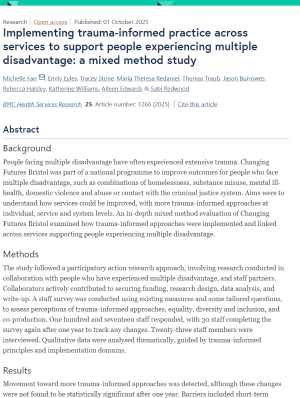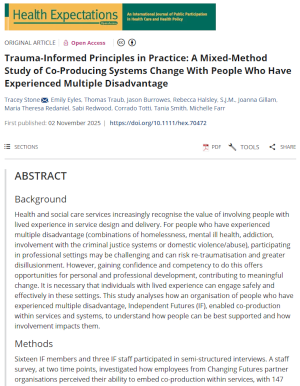Changing Futures: Improving mental health and wellbeing through trauma-informed support for people with multiple disadvantage
Changing Futures Bristol is part of a government funded programme aimed at improving the lives of adults experiencing multiple disadvantage.
People who face multiple disadvantage, such as homelessness, poor mental health, substance use or contact with the justice system, often have histories of trauma. Trauma-informed practice takes a person’s trauma into account, understanding that it can affect how they develop and function.
Being trauma-informed means all levels of an organisation are aware of the impact of trauma, how to identify and respond to it. Trauma-informed principles include safety, trustworthiness and transparency, peer support, collaboration, inclusivity, empowerment and choice.
Project aims
The Applied Research Collaboration (ARC) West received funding from the National Institute for Health and Care Research (NIHR) Three Research Schools Mental Health Practice Evaluation Scheme to evaluate the work of Changing Futures Bristol.
Changing Futures worked with organisations and people with lived experience to:
- Improve the way that services work, so people can access the support they need more easily
- Inform new services, government programmes and policy
- Help staff provide fair, accessible long-term services
- Promote equality and diversity, and include people with lived experience in designing services
We carried out a participatory evaluation, working alongside people with lived experience and staff, to evaluate their work.
What we did
There were three parts to this study. We evaluated:
- How trauma-informed approaches were being put into practice and what helped or got in the way
- Independent Futures, a group of people with lived experience of multiple disadvantage, part of the Changing Futures Bristol programme. This group enabled members to get involved in changing services and systems to better meet people’s needs
- My Team Around Me, a model that provides person-centred, trauma-informed support, co-ordinating services around a client
To do this, we:
- Surveyed 117 staff (with 30 repeating it a year later)
- Interviewed 23 staff and 16 lived experience representatives
- Analysed routinely collected surveys from 26 clients who were experiencing multiple disadvantage and were supported by the programme to understand what difference the support made. Clients answered these surveys at several timepoints so that any improvements in their wellbeing and outcomes could be measured
- Analysed internal evaluation reports
What we found and what this means
-
Implementing trauma-informed practices
Long-term commitment, stable funding, and cross-sector collaboration are needed to embed trauma-informed practice across services.
We saw some movement towards more trauma-informed ways of working, but the changes were not statistically significant after a year.
Enablers to this were support and resources for cross sector-collaboration, open decision-making, transparent management styles, opportunities to share learning, training and reflective practice for all staff including managers. Barriers included short-term funding, insecure contracts and pressures on staff.
Many staff had their own experiences of trauma, and this often motivated people to do their best for clients. Working with clients experiencing high levels of trauma can be stressful, especially where there are gaps such as a lack of mental health support.
Managers also faced a tough balancing act between meeting financial and performance targets and creating space for supportive, relational approaches. So, it’s important that the right support is provided for all staff.
The findings from the first staff survey are available in detail here (PDF). Full details are available in our article published in BMC Health Services Research.
-
Working with people with lived experience of multiple disadvantage
Independent Futures supported local and national work to improve services for people with multiple disadvantage. We found that Independent Futures modelled trauma-informed practice and helped influence systems change in some areas.
Their trauma-informed approach facilitated personal growth, improved confidence and some work skills for lived experience members, who contributed to 65 different workstreams.
However, embedding this involvement into wider services and systems was challenging. The staff survey highlighted resources, time, and hierarchical cultures as obstacles.
Everyone needs to adopt and commit to trauma-informed principles to make lived experience involvement work. This requires flexibility, openness and willingness, making sure principles like trust, transparency, empowerment, choice and safety inform people’s everyday actions. This work has been published in Health Expectations.
-
Supporting clients experiencing multiple disadvantage through My Team Around Me
My Team Around Me (MTAM) is a model that provides person-centred, trauma-informed support, co-ordinating services around a client.
We analysed the impacts of implementing MTAM approaches on clients’ outcomes and explored what skills and resources are needed to embed MTAM across different services. We are writing this work up.
What next?
We are exploring the sustainability of these ways of working, collaborating with Changing Futures Bristol as they continue their work.
Our findings will help organisations identify gaps and opportunities to work towards trauma-informed practice. This will benefit both staff and service users by reducing and preventing trauma when they interact with organisations.
Changing how organisations do things takes time and effort. However, evidence shows trauma-informed organisations are more likely to be effective in their service delivery. Their staff are also more likely to enjoy their jobs while being productive.
Papers

Implementing trauma-informed practice across services to support people experiencing multiple disadvantage: a mixed method study
Read the paper
Trauma-Informed Principles in Practice: A Mixed-Method Study of Co-Producing Systems Change With People Who Have Experienced Multiple Disadvantage
Read the paperLinks and downloads
- See the summary of the staff survey findings and what is happening in the areas highlighted by the survey Staff survey findings
Lead collaborators
- Aileen Edwards, Second Step
- Judi Kidger, University of Bristol
- Kath Williams, Bristol City Council
- Jason, Tom, Rebecca and SJM, Independent Futures, Second Step
ARC West Staff
Dr Emily Eyles
Research Fellow, Quantitative ResearchProfessor John Macleod
Professor in Clinical Epidemiology and Primary CarePartners on this project
Bristol City Council
The council plays a vital role in the health community as public health is part of its remit. Its role is to prevent disease, promote health, and prolong life among the population of Bristol. Its activities aim to provide conditions in which people can be healthy and it focuses on the population as a whole, not on individual patients or diseases.
University of Bristol
The University of Bristol is internationally renowned and one of the very best in the UK, due to its outstanding teaching and research, its superb facilities and highly talented students and staff. Its students thrive in a rich academic environment which is informed by world-leading research. It hosts the Elizabeth Blackwell Institute for Health Research.

